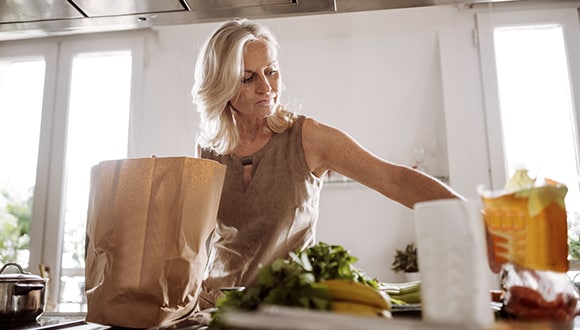Healthy eating after 50
Did you know that your food needs change as you age? Read our tips to help keep your bones strong, heart healthy and weight steady.
Carmel Sparke
November 2018
Our nutritional needs change throughout different stages of life. As we get older, we need less of some nutrients such as iron and grains. And we need more of others, like calcium and healthy fats, to accommodate changing hormone levels and metabolisms.
We take a look at how our diet may need to change from the age of 50 onwards.

Age 50-70
Women
Boost dairy intake
The average age for Australian women to hit menopause is 51. At this time, levels of the hormone oestrogen begin to fall, resulting in increased bone loss that may lead to osteoporosis.
As a result, women’s dairy intake needs almost double in this time to ensure you’re getting enough calcium. Dairy serves should increase from 2½ serves a day to 4 serves after menopause.
“It’s a significant increase, and I see so many women who are post-menopausal who don’t have nearly enough dairy in their diet,” says Melbourne dietitian Melanie McGrice. “They’re often worried to do so because they think it will cause additional weight gain, but often it actually helps your weight loss instead.”
Pick your protein
After menopause, women no longer need to replace iron lost each month through menstruation, so iron and protein needs drop a little, going from 2½ to 2 serves a day.
McGrice suggests replacing some of your red meat protein sources with fish and dairy. Fish has omega-3 fatty acids good for heart health, and dairy has calcium, good for bone health.
After the age of 50, the recommended serves of grains and cereals also drop from 6 to 4 serves a day. McGrice recommends choosing mainly wholegrain options like wholemeal bread, brown rice, oats and quinoa.
Men
Downsize meals if needed
Kilojoule needs for men – and women – decrease with age, as metabolisms slow down and activity levels commonly drop.
McGrice has noticed men in particular tend to stick to the same meal sizes as they did when they were younger.
You can work out your daily kilojoule needs with an online calculator.
Bump up healthy fats
One of the biggest health challenges men face as they age is the risk of heart disease, so healthy oils for cardiovascular health become even more important. Replace trans fats, found in deep-fried and baked foods, and saturated fats, found in butter, meat and coconut oil, with healthy fats, such as those found in olive oil, nuts and avocado, when you can.
In your 70s
Men & women
Fibre up
Maintaining healthy bowel function is more challenging as we age as your muscles, including the colon, become less efficient.
“It’s important to try to have plenty of water and plenty of fibrous vegetables and fresh fruit to help with healthy bowels.”
Men
Calcium smarts
Even though men don’t experience the same sharp hormonal changes as women, their need for calcium does increase past their 70s. The Australian Dietary Guidelines recommend that men should increase their dairy serves from 2½ serves to 3½ serves a day after 70.
In your 80s
Men & women
Maintain enough weight
Being underweight can sometimes become a bigger issue for some people over 80, as appetites can drop off owing to age and medications.
The recommended body mass index actually increases after the age of 65, says McGrice. So rather than thinking about weight loss, you can focus on eating a balanced diet. But speak to your GP before you make any changes.
Related articles
ARE ALL KILOJOULES CREATED EQUAL?
Experts explain what kilojoules are, where you should get yours from and how many you need to maintain or lose weight.
HOW TO REDUCE YOUR RISK OF OSTEOPOROSIS
The bone disease osteoporosis is common in women and men over 50. Here are some simple tips to keep your bones strong.
IS IT HARDER TO LOSE WEIGHT WHEN YOU’RE OLDER?
With a few lifestyle changes, maintaining a healthy weight doesn’t have to be hard as you age, says dietitian and exercise physiologist Caitlin Reid.
CAN AN EFFICIENT METABOLISM HELP YOU LOSE WEIGHT?
What does a fast or slow metabolism actually mean? Here’s what you need to know about this essential bodily function.